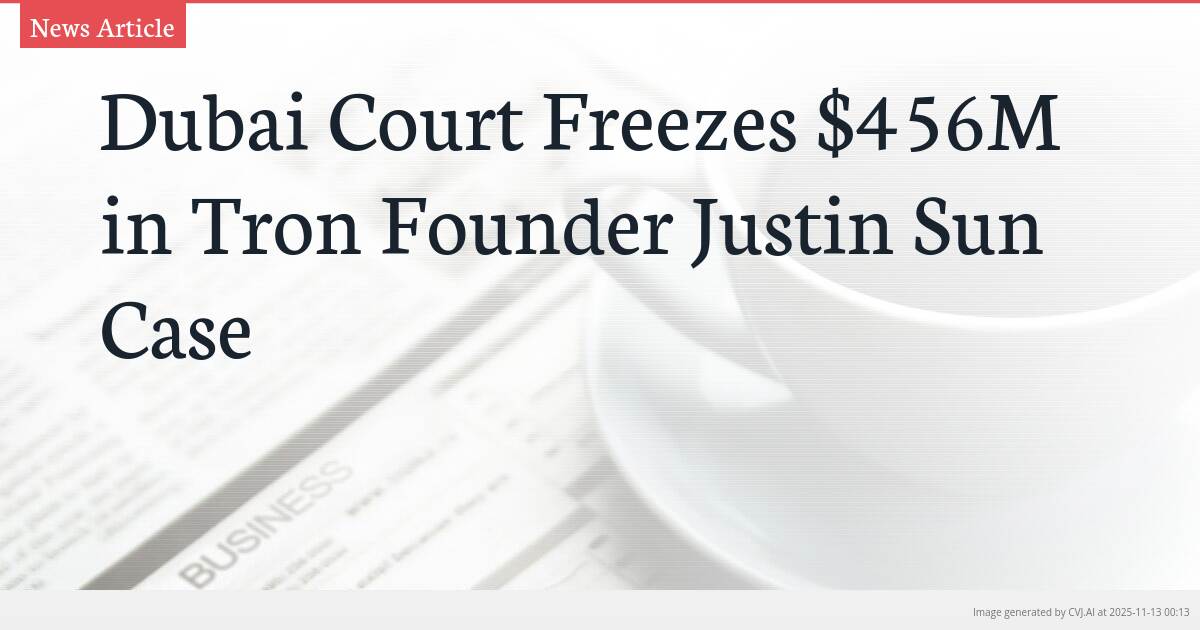This summary text is fully AI-generated and may therefore contain errors or be incomplete.
Introduction
A Dubai court has extended a worldwide asset freeze against Aria DMCC for $456 million in a high-profile case connected to Tron founder Justin Sun, marking a significant development in the ongoing legal battle over allegedly misappropriated TrueUSD stablecoin reserves. The Dubai Digital Economy Court’s ruling maintains both freezing and proprietary injunctions that will remain in effect until further court order, highlighting the growing intersection of cryptocurrency and international financial regulation.
Key Points
- The $456 million freeze stems from alleged diversion of TrueUSD stablecoin reserves to Aria DMCC instead of the intended Cayman Islands fund
- Tron founder Justin Sun is identified as an alleged beneficial owner of claimant Techteryx and reportedly bailed out the missing reserves
- The case involves multiple financial institutions including Mashreq Bank, Emirates NBD, and Abu Dhabi Islamic Bank as defendants
Court Order Extends Global Asset Freeze
In a landmark ruling on October 17, H.E. Justice Michael Black of the Dubai Digital Economy Court ordered the continuation of a worldwide asset freeze and injunction against Aria DMCC, prohibiting the company from removing or disposing of assets valued at $456 million. The Dubai International Financial Centre (DIFC) judge declared that the injunctions “shall remain continued until further order of the Court,” specifically barring Aria DMCC from removing assets from Dubai up to the $456 million value. The ruling represents one of the most significant cryptocurrency-related asset freezes in the Middle East to date.
The court also imposed a proprietary injunction preventing Aria DMCC from disposing, dealing with, or diminishing the cash or assets that were transferred to the company. This dual injunction approach ensures that the disputed funds remain preserved while the legal proceedings continue. The case stems from a July hearing involving claimant Techteryx Ltd against multiple defendants including Aria Commodities DMCC, Mashreq Bank PSC, Emirates NBD Bank PJSC, and Abu Dhabi Islamic Bank PJSC, creating a complex web of financial institutions entangled in the cryptocurrency dispute.
TrueUSD Reserve Controversy Deepens
The legal battle centers around Techteryx Ltd, which acquired the TrueUSD dollar-backed stablecoin in 2020 but encountered significant issues redeeming full reserve funds between 2022 and 2023. According to court documents, the reserve funds—which were managed by First Digital Trust—were allegedly diverted to defendant Aria DMCC rather than the designated Cayman Islands-based fund from which Techteryx was attempting to redeem reserves. This diversion created a substantial gap in the stablecoin’s backing, raising serious questions about reserve management practices.
Techteryx counsel Al Tamimi & Co detailed in a post-judgement brief that between May 2021 and March 2022, approximately $468 million was purportedly invested into the Aria Commodity Finance Fund, a Cayman Islands fund. However, in practice, $456 million of those sums were remitted directly to Aria Commodities DMCC in Dubai instead of the intended Cayman fund. This misdirection gave rise to proprietary and personal claims including breach of trust and knowing receipt, creating the legal foundation for the current asset freeze and ongoing litigation.
Justin Sun's Bailout Role Under Scrutiny
The reserve shortfall was ultimately filled through what court documents describe as a bailout by Tron founder Justin Sun, who is listed as an alleged ultimate beneficial owner of Techteryx in the court filings. Sun’s intervention to cover the missing TrueUSD reserves adds another layer of complexity to the case, connecting one of cryptocurrency’s most prominent figures directly to the legal proceedings. The involvement of such a high-profile industry figure has drawn increased attention to the case and its implications for stablecoin regulation.
The connection between Sun and the missing reserves raises questions about the oversight and governance structures within the cryptocurrency ecosystem, particularly concerning stablecoins that promise full reserve backing. The case demonstrates how traditional legal frameworks are being applied to cryptocurrency disputes, with Dubai’s specialized Digital Economy Court taking a leading role in adjudicating complex digital asset matters. The ongoing freeze order represents a significant test case for how international courts handle large-scale cryptocurrency disputes involving multiple jurisdictions and prominent industry figures.
Broader Implications for Crypto Regulation
The extended asset freeze against Aria DMCC signals a growing willingness by international courts to intervene in cryptocurrency matters, particularly when substantial sums and potential misappropriation are involved. The involvement of multiple established financial institutions—Mashreq Bank, Emirates NBD, and Abu Dhabi Islamic Bank—as defendants underscores how traditional banking entities are increasingly entangled in cryptocurrency-related legal disputes. This case may set important precedents for how courts handle similar situations involving digital assets and their traditional financial counterparts.
As the legal proceedings continue, the cryptocurrency industry watches closely for implications on stablecoin regulation and reserve management practices. The Dubai Digital Economy Court’s assertive stance in maintaining the $456 million freeze demonstrates the increasing sophistication of judicial approaches to cryptocurrency disputes. The outcome of this case could influence how regulators worldwide approach stablecoin oversight and what responsibilities fall to various parties in the cryptocurrency ecosystem, from founders and owners to custodians and financial institutions.
📎 Read the original article on decrypt.co

